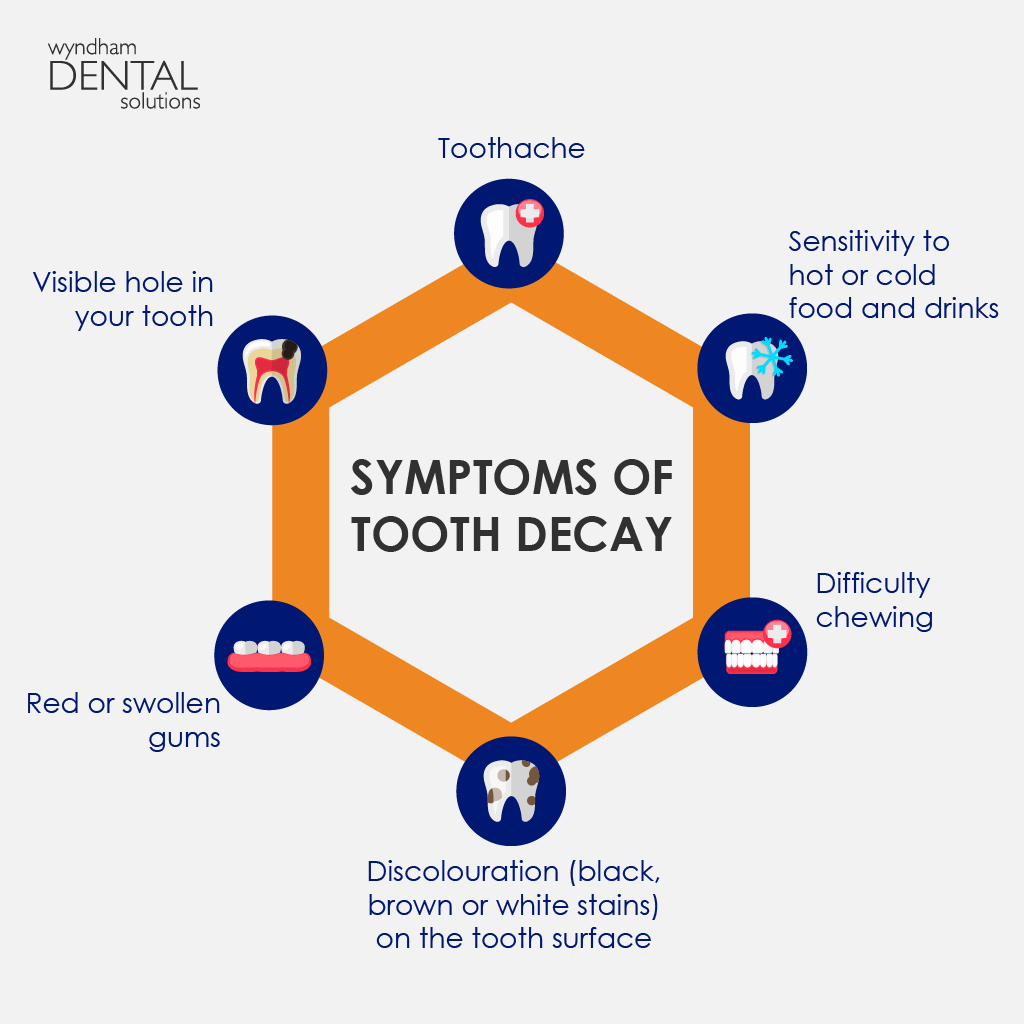Can Tooth Decay be Reversed?

Ugh, the constant throbbing, the flinching at every sip of coffee and bite of ice cream and chewing from only the “good” side can make you want to crawl under the covers. Let’s be honest, the shame of not brushing and flossing enough can add a whole new layer of frustration to the situation.
Despite all this, you may have delayed visiting the dentist, thinking the pain will eventually go away (spoiler alert: it won’t), just to take over-the-counter pain meds to help with the pain.
While they can dull the pain for a short period, they don’t quite address the root cause of decay or undo the damage caused.
That trip to the dentist you’ve been putting off is what will help you eventually. We know the idea of visiting the dentist might trigger some anxiety, but hear us out. If decay hasn’t progressed, our dentists at Wyndham Dental can help reverse the effects of tooth decay and get your smile back to its healthy, pain-free glory.
What is Tooth Decay?
Tooth decay is a common dental problem affecting many Australians, and it all starts with plaque (that sticky layer of bacteria) that builds up in your mouth.
When bacteria come into contact with sugars from your food and drinks, they turn those sugars into acid. And guess what? This acid is not your friend. It attacks your teeth, causing the minerals in your tooth enamel (the protective outer layer) to dissolve. This process, referred to as demineralisation, can weaken your tooth, eventually resulting in decay.
Risks of Tooth Decay
Ignoring tooth decay can lead to:
- Severe pain or sensitivity.
- Infections requiring root canal therapy.
- Damage so extensive that it may need tooth removal.

Dental Caries vs. Cavities
Have you ever heard the terms “tooth decay,” “cavities”, and “dental caries” thrown around and felt completely lost? Here’s the scoop. They are all related but aren’t quite the same.
Confusing, isn’t it? Let’s clear up the difference.
So, tooth decay and dental caries? Both terms are used to describe the same issue, they just have different names. Dental caries is simply the fancy medical term for what we commonly refer to as tooth decay. Both refer to the early stages of the decay.
What about cavities then? Cavities are the result of untreated tooth decay. These are the permanent holes and openings in your teeth left behind. Cavities should be avoided at all costs because it’s impossible to reverse a cavity once it gets deep enough.
Can You Reverse Tooth Decay?
In short, the answer is yes, tooth decay can be reversed. The key is to catch it early! If you catch tooth decay before it reaches the dentine (the layer underneath the enamel), we might have a chance of turning things around.
Here are some ways in which tooth decay can be reversed and prevented from getting worse while in its early stages:
Fluoride Treatment
Ah, fluoride – your enamel’s best friend.
When plaque attacks your teeth and wears down the enamel, fluoride can step in and save the day. How? By restoring minerals (remineralisation) to the surface of your tooth and strengthening it.
Here’s how fluoride treatment works. We will apply a layer of concentrated fluoride directly to your teeth. By penetrating the enamel, this fluoride solution will strengthen your teeth and stop further decay.
Improve Your Oral Hygiene
Consistent brushing and flossing are your best solutions against tooth decay. Here’s how you can improve your oral hygiene to keep your pearly whites plaque-free:
- Brush your teeth twice daily using fluoridated toothpaste. Pay attention to your brushing technique and use a soft-bristled toothbrush. Oh, and don’t forget to brush your tongue!
- Floss your teeth at least once daily to prevent plaque buildup, especially in hard-to-reach areas and between your teeth.
Improve Your Diet
We all love a sweet treat now and then, but too much of it is bad because sugar can team up with plaque to weaken your tooth enamel. So, here’s what you can do – swap those sugary treats for a nutritious diet which includes:
- High-fibre fruits and vegetables like apples, oranges and beans that promote saliva production, which helps wash away bacteria and food particles.
- Leafy greens and dairy products like milk and cheese are good sources of calcium (which helps strengthen your teeth).
- Nuts and seeds such as pistachios, sesame seeds and macadamia nuts.
We get that sometimes your sweet tooth can win. When you give in to your cravings, just grab your toothbrush and brush your teeth to prevent plaque buildup. Also, avoid frequent snacking because the more you snack, the more acid attacks your teeth are exposed to.
Stay Hydrated
We all know that water is good for you, but did you know that water is good for your smile, too? Here’s why!
Fluoride in tap water helps remineralise teeth, restoring minerals and making them more resistant to acid attacks.
Water also promotes saliva production, your mouth’s natural defence mechanism, which washes away leftover food particles and plaque buildup and neutralises acids in your mouth.
Regular Dental Check-Ups and Cleans
Brushing, flossing, and eating a healthy diet are great foundations for a healthy, decay-free smile. However, that alone may not be enough. The missing piece in your oral health puzzle is regular dental checkups!
These regular checkups are important because they allow our dentist to spot any sneaky signs of tooth decay early on before it can cause major problems. Plus, early detection means early intervention, which is always easier and more budget-friendly.
There’s more – in addition to a comprehensive examination of your mouth, we will also clear away any plaque and tartar buildup that cannot be removed with brushing and flossing, with a professional clean.
So, make sure to schedule these regular checkups every 6 months.
Chew Sugar-Free Gum
Did you know that gum (sugar-free gum, that is) can actually be good for your teeth?
Chewing sugar-free gum promotes saliva production, helping wash away food particles and bacteria in your mouth. It also helps prevent plaque buildup, the main culprit behind tooth decay.
The secret is to always choose sugar-free gum. Sugary gum can do more harm than good, promoting plaque and bacteria buildup instead of preventing it.
Tooth Decay Treatments at Wyndham Dental
We talked about catching tooth decay early and reversing its effects, but what happens when decay has already reached the nerve or pulp of your tooth?
If the damage has progressed, you may need more extensive treatment. Here’s a breakdown of the solutions we offer at Wyndham Dental:
- Dental Fillings: Fillings are the go-to solution for minor cases of tooth decay. Our dentists will remove the decayed portion of the tooth and fill the hole with dental filling material (composite resin), restoring both function and appearance.
- Root Canal Treatment: If decay has reached the nerve or pulp of your tooth, root canal treatment may be necessary to save it. During this procedure, we will remove the dental pulp (which contains blood vessels and nerves), clean the inside of your tooth, and seal it. Finally, a crown will be placed to strengthen and protect the tooth.
- Extraction: Sometimes, a tooth may be damaged beyond repair. In that case, extraction may be needed to prevent the infection from spreading. This is to be followed by the placement of a dental restoration like implants.
At Wyndham Dental, our dentists will work with you to determine the most appropriate treatment based on your needs and the severity of your condition.
Staying on top of your oral hygiene is the best way to keep your teeth healthy and decay-free. If you notice any signs of decay, schedule a check-up ASAP! The sooner we tackle the problem, the better our chances of turning things around.
Contact us at Wyndham Dental today to get your smile and oral health back on track!
